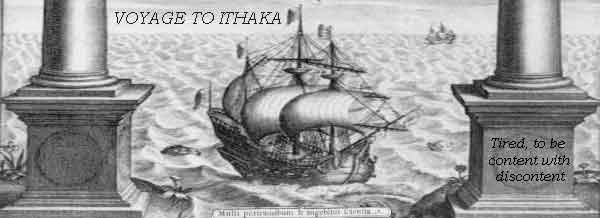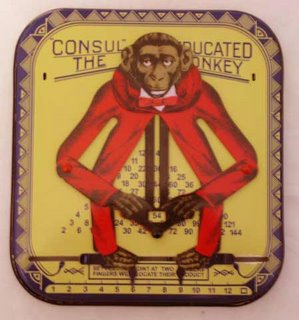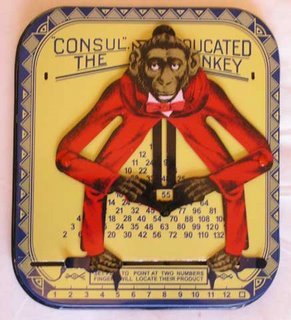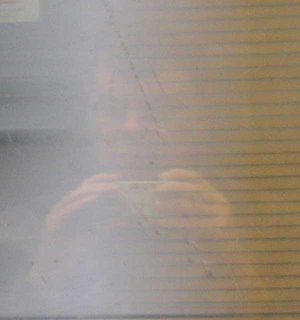Saturday, December 30, 2006
One of Edwin Morgan's
what I love about dormice is their size
what I hate about rain is its sneer
what I love about Bratach Gorm is its unflappability
what I hate about scent is its smell
what I love about newspapers is their etaoin shrdl
what I hate about philosophy is its pursed lip
what I love about Rory is his old grouse
what I hate about Pam is her pinkie
what I love about semi-precious stones is their preciousness
what I hate about diamonds is their mink
what I love about poetry is its ion engine
what I hate about hogs is their setae
what I love about love is its porridge spoon
what I hate about hate is its eyes
what I love about hate is its salts
what I hate about love is its dog
what I love about Hank is his string vest
what I hate about the twins is their three gloves
what I love about Mabel is her teeter
what I hate about gooseberries is their look, feel, smell and taste
what I love about the world is its shape
what I hate about a gun is its lock stock and barrel
what I love about bacon-and-eggs is its predictability
what I hate about derelict buildings is their reluctance to disintegrate
what I love about a cloud is its unpredictability
what I hate about you, chum, is your china
what I love about many waters is their inability to quench love
Monday, December 25, 2006
Saturday, December 23, 2006
Walking and not walking
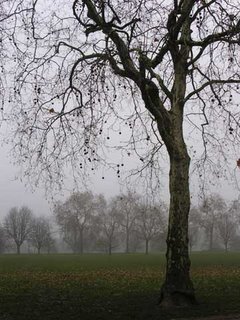 Yesterday I walked through wintry, foggy Hyde Park, taking in the Serpentine Gallery's exhibition of Damien Hirst's collection of contemporary art, and happily unaware that the very same fog was causing my friend M what must have been a dreadful six-hour delay as he waited for his flight at Heathrow.
Yesterday I walked through wintry, foggy Hyde Park, taking in the Serpentine Gallery's exhibition of Damien Hirst's collection of contemporary art, and happily unaware that the very same fog was causing my friend M what must have been a dreadful six-hour delay as he waited for his flight at Heathrow.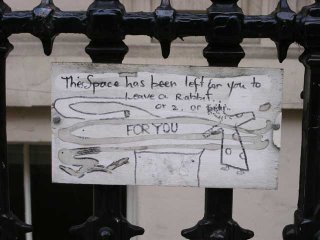
From Hyde Park, on to the V&A's exhibition on Renaissance Italy. the walk took me past this railing on Exhibition Road.
 But I won't be walking in the park for the next few days, having twisted my ankle on the uneven pavement coming back with my
But I won't be walking in the park for the next few days, having twisted my ankle on the uneven pavement coming back with my newspaper this morning.
"Reason is your superstition"
Golden Hair,
I heard you singing
In the midnight air.
My book is closed,
I read no more...
 Tom Stoppard's new play Rock 'n' Roll. A fascinating, sometimes uncomfortable, evening in the theatre. From the Prague Spring to the Velvet Revolution, we follow an ageing Marxist in Cambridge and young dissidents in Prague. Musically we follow Syd Barrett in the UK and the Plastic People of the Universe (who are in the photo above) in Czechoslovakia.
Tom Stoppard's new play Rock 'n' Roll. A fascinating, sometimes uncomfortable, evening in the theatre. From the Prague Spring to the Velvet Revolution, we follow an ageing Marxist in Cambridge and young dissidents in Prague. Musically we follow Syd Barrett in the UK and the Plastic People of the Universe (who are in the photo above) in Czechoslovakia.In my youth I loved Stoppard, while always feeling that the wonderful wit of, for example, Professional Foul, rather obscured any more serious content. Perhaps that was a reflection of my younger self rather than than a fair criticism. But certainly his recent work uses the same devices, the structural parallels and echoes, to entertaining but deeply serious effect.
A deeply depressing first half led to what was (for me, unexpectedly) an optimistic ending (my favourite character even gets the most interesting woman). But it was nevertheless an enthralling examination of one's political actions and inactions over the last thirty years (and the reaction of the, mainly middle-aged, audience suggested I wasn't alone in finding personal resonances with the on-stage events.)
How does one live under an oppressive government? Stoppard presents two friends, Jan and Fredinand, and indirectly the example of the Plastics.
How does one cope with the realisation that one's core beliefs are flawed?
Today's Britain subjects us to monitoring of individuals on a scale the Soviets could only have dreamt of. Our daily life is recorded in enormous detail. Meanwhile as a nation we are engaged in disastrous military operations which have led to hundreds of thousands of civilian deaths and which will inspire a generation of terrorists. Public services prioritise generating favourable headlines for ministers rather than quality of healthcare and education. And the crisis of global warming has yet to prompt any serious action by our leaders.
We have a government which announces a clampdown on bribery and shortly afterwards, without apparent embarrassment, abandons an investigation into corruption because it was apparently against the national interest. A corrupt senior government minister uses his position to do favours for his girlfriend. Nobody seriously believes the investigation into corrupt selling of political honours is going to lead to anything more than scapegoating of low-level officials.
No doubt there was similar corruption in pre-Thatcher Britain: my youthful naivety may have blinded me to it. But it certainly wasn't accepted as it is now. Those found to be corrupt were, genuinely, disgraced, rather than welcomed into lucrative media jobs. War was something to be avoided, rather than a difficult but necessary choice which ensured our beloved leader's place in history. The weak and underprivileged were to be helped, rather than scapegoated as potential terrorists. The government was to stand up for fairness and justice, rather than seek to raise public opinion against vulnerable minorities.
And what do I do about it? I pay my taxes and quietly get on with my life.
Thursday, December 21, 2006
Friday, December 15, 2006
Wednesday, December 13, 2006
"In perpetuity"?
 Pittencrieff Park, Dunfermline (photo by Dirk Haun)
Pittencrieff Park, Dunfermline (photo by Dirk Haun) Tuesday, December 05, 2006
Monday, December 04, 2006
More on "Edna"
My candle burns at both ends;
It will not last the night;
But ah, my foes, and oh, my friends -
It gives a lovely light!
But that was the extent of my knowledge of her, and I had never looked further. I had an image of her in my head from the distance past: an image which I now find was largely mistaken. And I think I've remembered where it came from. In my adolescence I read a novel called, if I remember correctly, The Dragon Variation by (I think) Anthony Glyn. It's a very entertaining novel set in the world of chess. And one of the players has a girlfriend who is fond of the poetry of Edna St Vincent Millay. [I'm thinking back to a book I read more than thirty years ago. I wish I could remember so well what I read last week!]
Glyn's novel, as I remember it, contains a scene in which the chess player, in the middle of having sex with his girlfriend, suddenly has a thought about his adjourned game: he immediately leaps from the bed and, abandoning her in the motel room without even a word, spends hours analysing the game. When I read the book as a nerdish teenager this seemed entirely reasonable behaviour, and the girlfriend's lack of appreciation of it was evidence, perhaps, her shallow character. Looking back now, I see that the scene might for some have a different interpretation. Indeed, the whole book might just have been poking fun at the chess world in a way which, at that age, I totally missed.
So my avoidance of Millay's poetry was a consequence of my adolescent lack of understanding of a (probably rather good) novel that was over my head.
Well, at least I've discovered her now.
Saturday, December 02, 2006
Carving in Rosslyn Chapel
Wine is strong. The king is stronger. Women are stronger still, but truth conquers all. (Book of Esdras)
Visited Rosslyn Chapel this afternoon. (Now all the Da Vinci Code nuts will visit my blog!)
